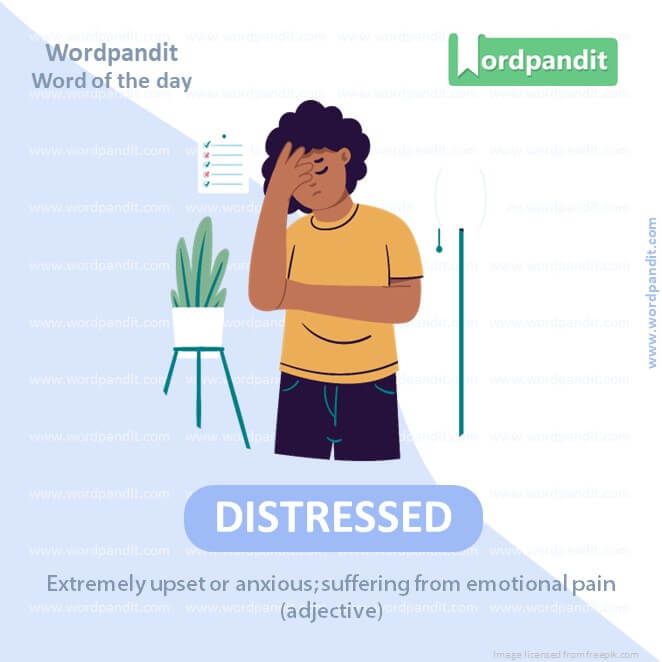Daily Vocabulary Words: List of Daily Used Words
Hi there. Welcome to this special section @ Wordpandit.
Our endeavour here is straightforward: highlighting important daily vocabulary words, you would encounter in The Hindu. This is your repository of commonly used words; essentially, we are posting a list of daily used words. Hence, this has significant practical application as it teaches you words that are commonly used in a leading publication such as The Hindu.
Visit the website daily to learn words from The Hindu.

WORD-1: THRONG
CONTEXT: On an early Wednesday evening, a group of about 30 people, mostly women, sing bhajans at the Radha-Krishna temple in the Talwandi area of Kota, Rajasthan. Most of them are from the lakhs of aspirants who throng the coaching centres of Kota every year with the hope of getting admission into India’s best engineering and medical colleges.
SOURCE: The Hindu
EXPLANATORY PARAGRAPH: Imagine going to a place where there are so many people, like a lot of kids at a super fun birthday party! That’s what we call a “throng.” A throng means a really, really big group of people all together in one place, maybe to watch a parade or be at a concert.
MEANING: A large, densely packed crowd of people or animals (noun).
PRONUNCIATION: thr-ong
SYNONYMS: crowd, multitude, assembly, gathering, horde, mob
USAGE EXAMPLES:
1. A throng of fans waited outside the concert hall.
2. The throng of shoppers made it difficult to move.
3. Tourists thronged the marketplace.
4. The streets were filled with a throng of protesters.

WORD-2: HEFTY
CONTEXT: Many parents take hefty education loans to send their children to Kota, in the expectation that they will study hard and secure a bright future for themselves.
SOURCE: The Hindu
EXPLANATORY PARAGRAPH: Imagine lifting a really big, heavy pumpkin! When something is hefty, it means it’s big and heavy. Like a hefty bag of candy could be really big and filled with lots of candies.
MEANING: Large and heavy in weight; substantial (adjective).
PRONUNCIATION: hef-tee
SYNONYMS: bulky, heavy, weighty, massive, considerable
USAGE EXAMPLES:
1. That’s a hefty book you’re reading.
2. She made a hefty donation to the charity.
3. The athlete has a hefty build.
4. He took a hefty swing at the ball.

WORD-3: CONGREGATE
CONTEXT: The Kota Police have also formed a ‘student cell’ headed by Assistant Superintendent of Police Thakur Chandrasheel Kumar to visit hostels, messes, coaching centres, and other points where students congregate, to help distressed aspirants.
SOURCE: The Hindu
EXPLANATORY PARAGRAPH: You know how you and your friends come together to play? That’s a bit like “congregate.” When people congregate, they gather together in one place for a special reason.
MEANING: To come together in a group or crowd (verb).
PRONUNCIATION: kong-grih-gate
SYNONYMS: assemble, gather, meet, collect, convene
USAGE EXAMPLES:
1. People congregate in the park for concerts.
2. Birds congregate near the lake.
3. The students congregated in the cafeteria.
4. Families congregate for holiday celebrations.

WORD-4: DISTRESSED
CONTEXT: The Kota Police have also formed a ‘student cell’ headed by Assistant Superintendent of Police Thakur Chandrasheel Kumar to visit hostels, messes, coaching centres, and other points where students congregate, to help distressed aspirants.
SOURCE: The Hindu
EXPLANATORY PARAGRAPH: Have you ever lost your favorite toy and felt really sad and worried? That’s what “distressed” means. It means you’re really upset or worried about something.
MEANING: Extremely upset or anxious; suffering from emotional pain (adjective).
PRONUNCIATION: dih-strest
SYNONYMS: upset, troubled, anxious, agitated, distraught
USAGE EXAMPLES:
1. She looked distressed during the exam.
2. The distressed animal was rescued.
3. The news made him feel distressed.
4. The ship sent out a distressed signal.

WORD-5: REPEL
CONTEXT: Nitin Vijay, founder of the Motion Education coaching centre, says if the dream of securing a top rank can attract lakhs of students to the city, disturbing news can equally repel them.
SOURCE: The Hindu
EXPLANATORY PARAGRAPH: Imagine you have a magnet. Sometimes, two magnets stick together, but other times they push away from each other! When they push away, they “repel.” Repel means to push something away or make it go away.
MEANING: To drive away or cause to move back; to reject or resist (verb).
PRONUNCIATION: ree-pel
SYNONYMS: push away, fend off, ward off, repulse, deter
USAGE EXAMPLES:
1. The spray repels mosquitoes.
2. His rude behavior repels people.
3. The magnets repel each other.
4. The army repelled the attack.
WORD-6: DEFLATION
CONTEXT: The news about China’s economic slowdown has caused mixed reactions. China, for long, had been worried about fears of a slowdown and a middle-income trap. Now, there are fears of deflation which may bring bad news for China and the rest of the world. Thus, understanding the causes and the magnitude of China’s present-day economic challenges is essential.
SOURCE: The Hindu
EXPLANATORY PARAGRAPH: Imagine you have a balloon filled with air, and then you let some air out so it gets smaller. “Deflation” is like that, but for money. When deflation happens, prices for toys, games, and even food get lower, but it usually means people have less money to spend.
MEANING: A decrease in the general level of prices for goods and services, often accompanied by a reduction in the supply of money and credit in the economy (noun).
PRONUNCIATION: dee-flay-shun
SYNONYMS: contraction, shrinkage, reduction, downturn, decrease
USAGE EXAMPLES:
1. The country is experiencing economic deflation.
2. Deflation can make debts harder to pay off.
3. The central bank is worried about deflation.
4. During deflation, consumers often delay purchases.
WORD-7: MAGNITUDE
CONTEXT: The news about China’s economic slowdown has caused mixed reactions. China, for long, had been worried about fears of a slowdown and a middle-income trap. Now, there are fears of deflation which may bring bad news for China and the rest of the world. Thus, understanding the causes and the magnitude of China’s present-day economic challenges is essential.
SOURCE: The Hindu
EXPLANATORY PARAGRAPH: You know how some things are really, really big and some things are small? “Magnitude” is a word that helps us talk about how big or important something is. Like, a big mountain has a high magnitude because it’s so huge!
MEANING: The great size, extent, or importance of something (noun).
PRONUNCIATION: mag-ni-tood
SYNONYMS: size, scale, enormity, extent, significance
USAGE EXAMPLES:
1. The magnitude of the problem was overwhelming.
2. The earthquake had a high magnitude.
3. They failed to understand the magnitude of the task.
4. The telescope can detect stars of smaller magnitude.
WORD-9: FEISTY
CONTEXT: Sha’Carri Richardson was on the superstar arc when she broke the 100 metres NCAA collegiate record as a 19-year-old in 2019. With her obvious talent, feisty attitude and striking charisma, she looked set to blossom into not just an elite sprinter but also a fan-favourite who could fill stadiums.
SOURCE: The Hindu
EXPLANATORY PARAGRAPH: Feisty people are like little sparks of energy. They are lively, determined, and perhaps a little bit fiery! Someone who is feisty doesn’t back down easily and adds zest to any situation.
MEANING: Lively, determined, and courageous; full of spirit (adjective).
PRONUNCIATION: fye-stee
SYNONYMS: spirited, lively, plucky, fiery, spunky
USAGE EXAMPLES:
1. The feisty entrepreneur didn’t give up even after multiple setbacks.
2. She’s a feisty competitor on the field.
3. He is known for his feisty debating style.
4. Her feisty spirit made her a fan favorite.
WORD-10: RAUCOUS
CONTEXT: A raucous debate — a lot of it hashed out on social media — ensued over whether marijuana, not a performance enhancer, belonged on the banned list (it’s still there), but also whether regulators were too eager to go after a young, outspoken, Black, American woman (they said everyone is subject to the same rules).
SOURCE: The Hindu
EXPLANATORY PARAGRAPH: You know when you’re at a party and everyone is laughing, shouting, and making lots of noise? That’s what “raucous” means! Raucous is when something is really, really loud and full of energy, like a noisy playground.
MEANING: Making or characterized by a harsh, loud noise; boisterous (adjective).
PRONUNCIATION: raw-kus
SYNONYMS: noisy, loud, rowdy, boisterous, uproarious
USAGE EXAMPLES:
1. The crowd was raucous during the concert.
2. The party became raucous as the night went on.
3. The children let out raucous laughter.
4. The debate was interrupted by raucous shouts.
Vocabulary List
Commanding a broad vocabulary empowers individuals to communicate clearly and effectively. A central tool in this language learning journey is the well-organized vocabulary list. But how can one enrich their language learning experience using a vocabulary list? Here are some instrumental strategies.
The first step to leverage a vocabulary list is to comprehend its organization. Vocabulary lists are often categorized based on themes, frequency of usage, or complexity. Having a clear understanding of this layout helps to plan your learning trajectory effectively, ensuring you glean maximum benefit from the vocabulary list.
Next, understanding the context of words in your vocabulary list is crucial. Often, the meanings of words are influenced by the context in which they are used. Therefore, explore these words beyond your vocabulary list, in various texts or spoken dialogues, to understand their diverse applications and nuances.
One effective method to retain the terms from your vocabulary list is integration into your daily life. Your routine conversations, emails, or writings should reflect the words you learn, facilitating their transition from passive vocabulary to actively used terms. Constant implementation of words from your vocabulary list will solidify these words’ usage over time.
Additionally, mnemonic devices can enhance the retention of words from your vocabulary list. Mental associations, auditory cues, or visual imagery connected to words provide a fun and effective way of remembering terms, enhancing your overall learning experience.
Finally, systematic revision of your vocabulary list is key. Regular review of previously learned words fortifies your grasp over their usage and helps prevent them from slipping out of memory.
In essence, using a vocabulary list efficiently involves understanding its layout, context learning, regular application, use of mnemonics, and timely revisions. When wielded appropriately, a vocabulary list can prove to be an indispensable tool in your journey of language enrichment.







